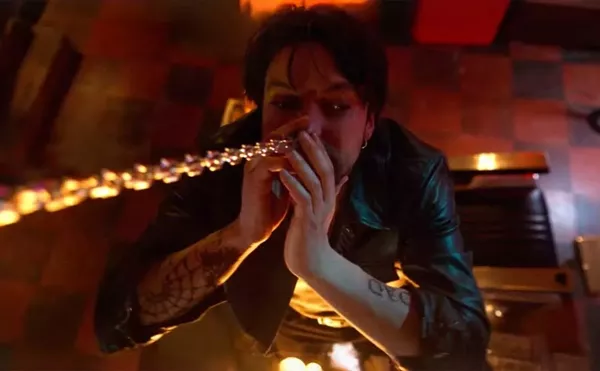
Audio By Carbonatix
[
{
"name": "GPT - Leaderboard - Inline - Content",
"component": "35519556",
"insertPoint": "5th",
"startingPoint": "3",
"requiredCountToDisplay": "3",
"maxInsertions": 100,
"adList": [
{
"adPreset": "LeaderboardInline"
}
]
}
]
Straight down the rain-soaked I-75.We squint and make cathedrals of factory stacks rising from deep emerald green, and dream of far-off lands and Hitchcockian close-ups, only to be smacked into reality by a corporate behemoth. McDonald's — those promoters of human chub, hasty deaths and environmental decimation — in its up-to-the-moment billboard features an image that could be described as a frilly white rose floating in cup of sewage. The new Mac coffee. Joy.
Roadtrip reverence? Dead.
It takes three smokes, all of Frankie Miller's The Rock, and a small dip on the gas gauge needle to roll just over the Michigan border into Toledo.
Hotel's cheap, barely 40 bucks for the night. Toledo's Classic Inn is one of those fading early '70s jobs, whiffs of Holiday Inn heyday, now a three-story dispossessed wonder that sits just off the I-75 off-ramp, and borders what appears to be a chainlinked-in Mack truck graveyard. Office smells of curry and the sightline's taken by superimposed details, the hand-scrawled renter instructions and pizza delivery options. My dirt-hued room sports a TV, an itchy-poly bedspread and a cottage cheese ceiling with a water stain shaped like Mexico — thoughts of Nogales whorehouses suddenly rise, and that bizarre drunken night where I fell in love.
No, not Mexico. It's Toledo. Northside. And this inn — with no WiFi, no backpacking trust-funders, no faceless business suits and no shiny rentals cramming the lot — is the kind of lonely, time-obstructing digs I adore.
Next, a day of strolling and observation in Toledo gives up notes: A World War I-era boom economy bestowed a wealth of mid-American riches. Claret and butter-colored downtown mansions reflect this; Tudor craftsmen and Victorians with generous front porches, ominous and beautifully kept on vast lawns with lilacs and magnolias, maples and sweetgum. Little wildwood animals scurry about. Inner Toledo has real beauty, similar to that found in other past-their-prime rust-belt cities. Like Detroit, Toledo has the feel of a place that's treading water, sucking for air.
Ohio could be the Florida of the Midwest now, tarnished by ugly Republicans and cockeyed voting booth practices, but don't include Toledo.
How a city presents art can say much about its communal spirit, particularly one sucker-punched by the failing auto industry. The Toledo Museum of Art rests just west of downtown on Monroe Street. Inside there's a pop-eye round-up of Mondrian and Modigliani, Rubens and Delacroix. That an art museum in Toledo could house Cezanne suggests some kind of through-the-years progressiveness.
Downtown's mix of clean streets, sports pubs and smoked-glass modernity edges turn-of-the-century charm, such as the renovated Valentine Theatre. And there's the University of Toledo's eerie Gothic main hall.
While Toledo never became "The Future Great City of the World" as proclaimed by a Toledo Blade editor more than a century ago, this shrinking city — once known for great labor unions, sparks plugs and Jeeps — does have the mighty Mud Hens, whose Fifth Thirdfield is a sleek modern ballpark, a mini Comerica Park that benefits from breezes off the lovely and muddy Maumee River.
LaGrange Street and others running into Polish Village are lined with what look like boarding houses converted into flimsy drywall apartments, and I notice more than a few faces with deep wide eyes staring through smudged glass from murky living rooms, just sitting, just staring. Dazed-looking folks rain-wet in sleeveless T-shirts cross streets at angles far from the nearest crosswalk, but nearest a liquor store.
Polish Village has been gentrified in recent years, the brickwork sidewalks, refurbished streetlamps and revamped storefronts lend the mom-and-pop business stretch an air of community resilience. I found AA Records Are Us by chance, along a rainy walk; a weird gem in an otherwise odd gray day.
The door is locked but the shop is open. Once you buzz, 70-year-old owner Frank Lynn rises, shuffles to the wood and glass door and gives you the once-over before he unlocks.
AA has the thumbprint of every great record store you've ever set foot in. Shadows of homemade record bins extend across wood floors and Jim Beam bottles on high shelves keep watchful eye on thousands of records, unkempt '60s-'70s hifi gear and dust. Album cover faces on walls give the feeling you're being watched. The place, it turns out, is a bin-diver's wet-dream, a record geek Christmas tree — what with, Lynn says, more than half a million records. And it is the largest and most valuable vinyl collection this writer has ever laid eyes on.
Frank's a gentle sort whose wife died years ago, and who lives alone above his shop with his dog Coco, a friendly and barrel-shaped shepherd of some sort. Frank would rather be fishin' most days and his capacity to tolerate extended intervals of uncolored time has limits, so he sometimes closes up and grabs the poles.
And old Frank is old-world. Forget online bidding sites for selling records because Frank is long over the idea of perhaps owning a computer. The idea of any advertising budget is dismissed with a cranky wave of his hand (with exception, he says, to one local Yellow Pages listing.) His good customers, some from Japan, others from the UK — maybe the occasional musician on tour — get hipped to AA by word-of-mouth. Some days, Frank says, nary a soul strolls in. Besides, he says, he doesn't need the business so much; he gets by on a union pension and Social Security.
Lynn shuffles more than he walks, his butterscotch-colored button-down sweater is more Bing Crosby than record retailer, and his consequent in-store tedium is broken by the TV flickering near the front.
Lynn's real gold is stored upstairs in his multi-room flat — tens of thousands of boxed LPs and 45s, most of which are unmarked, unsorted and unpriced. Boxes extend floor-to-ceiling in each room and hallway except Frank's bedroom and kitchen. The sheer number of unclaimed vinyl valuables is jaw-dropping. A box of collector-quality Blue Note 10-inches there, a mountain of mint Miles Davis LPs here, a perfect mono Sgt. Pepper's Lonely Hearts Club Band leads a row of unboxed Beatle albums.
The father of five got into record retail by chance, he says, 25 or so years ago. He'd been laid off his construction gig and had a garage sale to raise money. By that day's end, it was the box of records that had sold. And the promise of selling LPs and 45s for profit got him thinking. He was an avid collector of rare Jim Beam bottles then ("I wanted the bottles, but I couldn't drink all that whiskey, so I gave it away. I got invited to a lot of weddings then.") and he began trading the empties for records — straight across, a bottle for a box of wax. Soon the vinyl was piled up high and wide.
"I ended up with a garage full of records," Frank says, with an easy laugh. "A 24-foot by 24-foot two-car garage full." Of course, he didn't exactly know which records would sell and which wouldn't. He discovered soon that his new collection was pure crap, "mostly Lawrence Welk, Guy Lombardo and Christmas music." He ended up dumping them all, filling a "30-yard dumpster full of records."
It was a hard lesson that taught Frank much about the record trade. He kept at it and soon he had a shop.
Upstairs Frank has a local guy, Jared Hale, helping him sort and price pieces. Hale's a music fanatic who's constantly amazed at the prizes he uncovers, all part, I'm told, of a huge collection that Frank recently purchased from a private collection. Hale lifts a stack of well-kept Detroit 45s from the '60s and '70s that he'd just found in few boxes — a veritable treasure trove of Detroit name collectibles. "You'll find anything from Detroit labels in here," Hales says. A cursory once-over sees J.J. Barnes on both the Ring and Ric-Tic labels, Pat Lewis on Golden World, Dee Edwards on Bump Shop, the Fantastic Four and Darrell Banks on Ric-Tic, Mad Dog and the Pups on Magic City, Bobby Franklin on Fee, the old Faygo Beverages theme song on the Faygo's own label, lots of stuff on Fortune and so on. None of which is even priced.
After some time spent going through records, we go downstairs to the shop and purchase a few items. After which, Frank shuffles back to his chair, drops in slowly and turns his gaze to the television.
Outside the rain just falls. There's talk of flooding in Toledo tonight.
AA Records Are Us, 3010 LaGrange, Toledo; 419-726-6050. Open daily, 10 a.m. to 6 p.m.
Brian Smith is Metro Times features editor. Send comments to bsmith@metrotimes.com





